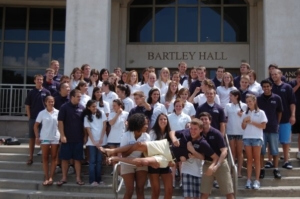
At Villanova School of the Business, careers services staff say their students are very relationship-oriented. Courtesy photo
STUDY SHOWS STUDENTS ENJOY CONVENIENCE, BUT PREFER TWO-WAY DIALOGUE
For Mary Scott of Scott Resource Group, all of this begs the question: do students perceive video interviewing favorably or unfavorably? Her firm, which works with employers to research students’ perspectives on pressing workplace topics, set out to find the answer in a 2017 research study made up of 511 undergraduate students from 19 universities.
Of the 511, some 42% were business school undergrads and 64% were pursuing internships as opposed to full-time, permanent roles. An immediate finding to note is the favorability toward one-way, pre-recorded interviewing among students who have had experience with it versus those who have not. When asked if they were favorably impressed with companies that either use one-way digitally-recorded technology such as HireVue, offer on-demand interviews rather than having to schedule one, or that record their interview for later assessment, students who had asynchronous interview experience rated it less favorably each time.
Other parts of the study found some hefty disagreements about certain statements related to video interviewing. For instance, the notion that students are okay with having an online or video interview in place of an on-site selection interview was largely refuted. Particularly, 65% of the business school students said they somewhat or strongly disagreed. Another statement not favorably supported by students: ‘video interviews offer a more compelling candidate experience.’
GOOD IN THEORY ONLY?
For Scott, all of this shows that pre-recorded interviews sound good in theory, but actual usage may prove feelings toward it that are altogether different.
“When it comes to students preferring digital connection, it’s bordering on strong disagreement,” Scott explains. “Video interviewing feeds the notion that employers can save a lot of money expenses and people resources by using a tech screening device, but my question is at what cost? It’s the basic finance concept of opportunity cost. They’re paying a price for what they’re doing. The perception created among students is that their not valued, not being invested in.”
At the Villanova School of Business, career services staff can attest. “Our population of students, they’re very relationship-oriented,” Brenda Stover, executive director of the Center for Professional Development told Poets&Quants in a previous interview about this and other recruiting trends. “Non-physical contact is a slight to them.”
Specific to recorded interviews, Stover says companies assume students would love it, but oftentimes times they don’t.
To this end, Scott feels the video platform vendors that companies are opting for are overgeneralizing students. “Marketers are making amazing generalizations about millennials and Gen Z and students are insulted by it.”
She adds, “It’s totally understandable why employers are embracing this trend; because of the savings it affords, but students have a different view and I think it’s important to understand their perceptions and the impact. Students know it’s about the savings. That’s one thing they fully understand. I have not talked to one students who thought pre-recorded was for their benefit.”
EMPLOYER ADVICE
In the study, video interviewing did score well with students so far as convenience was concerned. However, they prefer two-way communication tools such as Skype or Google Hangouts versus a pre-recorded party of one.
Scott offers several words of caution to employers. First, remain cognizant of the trade off of student perception. “I caution them to just understand the trade off because there are compelling arguments for using this: saving resources whether they be budget or staff.”
Second, is what she says is a potential unforeseen downside: students receiving too many. “Employers do seem to be throwing a very wide net, especially if they’re using it as first step in screening,” she says. “Students get so many of these requests now because it’s so easy for employers to invite them that some are becoming overwhelmed by them.”
WHAT’S A B-SCHOOL TO DO?
Finally, as all of this unfolds, schools are doing what they can to prepare students for what may be the future of recruiting.
At Villanova, recorded interviews that used to be purely for practice purposes to allow students to see how they project themselves are now required by all students to help prepare them for virtual interviews.
UNC student Patrick Lyons gives kudos to Kenan-Flagler for using an online platform as a pre-screener to get into the business school. “I think it was a great move by them recognizing the trend early on. It gave students a taste of what was to come way in advance.”
DON’T MISS: WHY ARE BANKS TARGETING B-SCHOOL STUDENTS SO EARLY or 4 KEY TRENDS HAPPENING NOW IN BIZ ED











Questions about this article? Email us or leave a comment below.